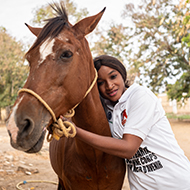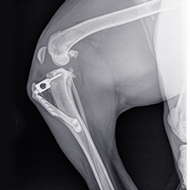Tracey Killen of The John Lewis Group has been guest speaker on the opening day of the VPMA/SPVS Congress.
Focus on gaining the most from your staff
It has been an inspiring start to the second annual joint VPMA/SPVS Congress which opened this morning at Celtic Manor in Newport, South Wales.
The focus of many of the talks has been on managing and developing staff.
The presidents of the two organisations opened the congress together.
Adi Nell, president of SPVS said: "Successful practices are ones that recognise the staff are their greatest asset. Being able to identify these staff, being able to attract them, engage with them and hold onto them, I think is a challenge for all of us."
VPMA president Helen Sanderson meanwhile said she was pleased that mental health and wellbeing, would be addressed over the two day congress.
"This is something that is increasingly important for practices to recognise," she said.
Tracey Killen, HR director for John Lewis and a main board director of the John Lewis Group, was guest speaker at the opening of the congress.
She is married to a veterinarian and spoke of how her experience of managing 86,000 staff, relates directly into the everyday life of a veterinary practice.
"The veterinary industry is undergoing a once in a lifetime tumultuous shift," she said. "No business no matter where it is has the right to exist."
She spoke of how John Lewis had invested in his staff and eventually handed over the company to a partnership, because he recognised the benefits it would bring.
"He hit on something really important which is if you invest in your people, you create value in terms of the benefit you get from when your customers come into your shop," Mrs Killen said.
A key message from Mrs Killen was that practices needed to be clear of their purpose.
"It will be the glue that holds your business together when you go through tough times. Your strategy will shift but your purpose will literally hold your business together."
Managers, she said, needed to make sure staff understood the purpose and goals of the business.
"Nobody goes to work to do a bad job," she said. "People perform better if they know why and it creates a culture of incremental improvement."
That, Mrs Killen said, involved telling staff if they are doing a good job, and constantly working with them to develop and improve their skills.
She also spoke of the need for veterinary practices to understand its market, to be aware of the growing need to provide online services and to adapt their business to meet their customers' needs – or lose their market share to other retailers like the supermarkets.
"There is a tsunami of change around you," said Mrs Killen.
Helping staff overcomes stress was the topic of a seminar led by The Mindfulness Exchange (TME).
"You cannot listen to someone else if you can't listen to what is going on in your own body," said Mark Leonard, from TME.
He and his colleague Marina Grazier touched upon techniques to deal with stress and focus the mind back on the present.
CVS Group is the first veterinary business to go through mindfulness training. Its health and safety manager Sean Gilgallon said: "We did this because we knew people that worked for us and had issues. We know vets are top of the suicide list, so we took this up not knowing if it would work."
He said it had made a real difference to his staff both at work and at home.
Alan Robinson from Vet Dynamics, speaking about managing cash-flow in the tough economic times, said the industry as a whole had grown complacent, insular, and reactive rather than proactive.
"Just because there is a downturn doesn't mean productivity is going to go down, and just because there is an upturn, it doesn't mean you can rest on your laurels and float on the same tide," he said.
He too spoke about having a clear direction and message for your business, properly assessing your staff and where necessary making redundancies.
"I think this recession has been tremendously good for all of us in that it has made us look at our people. It can be expensive, it can be nerve wracking – but I guarantee that it needs to happen," he said.
The most inspirational speaker of the day, was, however, Katherine Eitel, of The Lioness Principle.
She shared her own story of her experience as a dental nurse "smiling walking to the car thinking I'm pretty sure I've just got fired," after her boss set the bar for her performance and challenged her to meet her own potential. It was a challenge she accepted.
She said great managers see the under utilised potential in staff and "leverage" it out from them, both to the benefit of their employ and the business as a whole.
The congress continues.







 Birmingham Dogs Home has issued an urgent winter appeal as it faces more challenges over the Christmas period.
Birmingham Dogs Home has issued an urgent winter appeal as it faces more challenges over the Christmas period.
